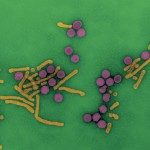Link to Pubmed [PMID] – 16310901
Vaccine 2006 May;24(21):4482-9
Hepatitis B virus (HBV) is the major pathogen of chronic hepatitis and liver disease worldwide. Despite the availability of effective vaccines against hepatitis B for many years, over 370 million people remain persistently infected with HBV. Viral persistence is thought to be related to poor HBV-specific T-cell responses. Based on clinical data, the development of efficient methods capable of inducing strong T-cell responses is an important and primary step toward the development of immunotherapeutics against chronic HBV infection. We designed a phase I clinical trial in chronic HBV carriers to assess safety, tolerability and immunogenicity of a DNA vaccine expressing HBV small (S) and middle (preS2 +S) envelope proteins. After occurrence of lamivudine breakthrough, 10 HBeAg positive patients with chronic hepatitis B were followed longitudinally before, during and after DNA vaccine therapy. Immunizations were well tolerated and adverse physical events were mild and considered unrelated to the vaccine. Proliferative responses to hepatitis B surface antigen (HBsAg) were detected in two patients after DNA injections. Following three injections of vaccine, interferon (IFN)-gamma-producing T-cells specific for the preS2 or the S antigen were detectable in 50 and 100% of the patients, respectively. Each patient recognized at least one peptide within the envelope domain encoded by the vaccine. Anti-preS2 antibodies and seroconversion to anti-HBe were detected in two patients. This study shows evidences for the safety and immunological efficacy of HBV-DNA vaccination and demonstrates that DNA vaccination can restore or activate T-cell responses in chronic HBV carriers.

